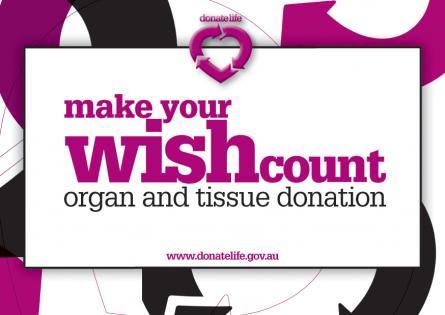It may be a cliché, it may sound cheesy but it’s true – some things in medicine are miracles. The birth of a child, the successful separation of Siamese twins, the first step of a trauma victim in a spinal rehabilitation unit.
Massive personal triumphs witnessed by few; they are too numerous to describe, but the real reason we go on in the face of occasional piercing tragedy.
Transplantation is without doubt one of these miracles. When you stop to think it through, to overcome the logistical challenges alone involved in the surgical retrieval, preservation, transport, allocation and reimplantation is, in itself, a miracle. Not to mention the immunosuppressive drugs which make it possible to have part of someone else inside of you.
For me, however, the real miracle is that when someone dies - at a moment of infinite, unanticipated loss - an individual, a family, a community can contemplate and respond to the needs of someone not even in the room.
A stranger with organ failure unrelated to the family or individual whose generosity and bravery will make the rest of his or her life possible.
That is a miracle I have witnessed many times; to see that kind of selflessness is to be faced with all ones frailties and limitations in an instant. It is not to be ignored.
In 2012, 354 multiorgan donors gave the opportunity of a better life, any life to 1,052 transplant recipients. Many more tissue donors created new and better lives.
Many of these events were life saving, all were life changing for more than just the recipient. Can you imagine being the child of a father who has had his sight restored by a corneal tissue graft?
Yet with over 70,000 Australians dying in hospital each year, why are there so few organ donors when so many patients could benefit from organ transplantation?
Like so many things the answer is simple and complicated at the same time.
Let’s start with the simple bit. Simply not enough people say yes to donation, simply not enough doctors and nurses ask for permission. Simply not enough of us know the wishes of our loved ones on this and other matters related to death and dying. Less than 60% of families give permission for organ donation to proceed in Australia. That figure is an average, higher in some parts of the country and in some hospitals. The new Australian Organ and Tissue Donation and Transplantation Authority is working hard, training doctors, nurses and allied health professionals to provide the community and the health system with the support we need.
If families are aware of the wishes of a loved one, then permission is granted in over 90% of cases. It’s one less decision to have to make. It’s better to know what we would have wanted if we were there to say it, yet only 44% of us know the wishes of those who share our lives.
The complicated bit is that very few people, thankfully, die in circumstances where organ donation is possible - where the brain is so severely damaged that death has occurred or is imminent yet the vital organs can be protected by technological means. In fact, less than 2% of hospital deaths occur in such circumstances so each and every occasion is a very precious opportunity to explore the wishes of the ones we love, to reflect the values of our community, to achieve what that individual would have wanted us to.
Organ donation is Australia has very high levels of community support, a clear legal, ethical and governance framework of checks and balances and outcomes that are the best in the world.
Please talk to your family, your BFF’s, your parents. Discover the facts, decide to donate and discuss your decision with those who need to know.
This week is Donate Life Week. To find out more, please visit Donate Life.


















__small.png)










